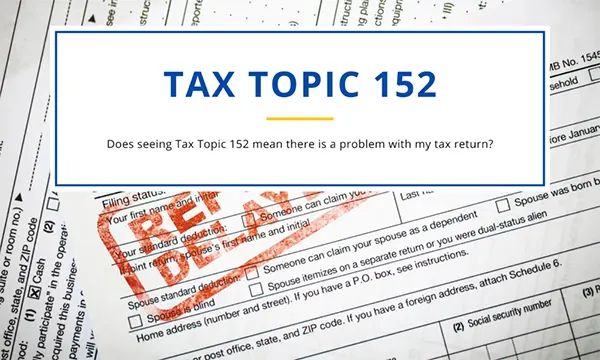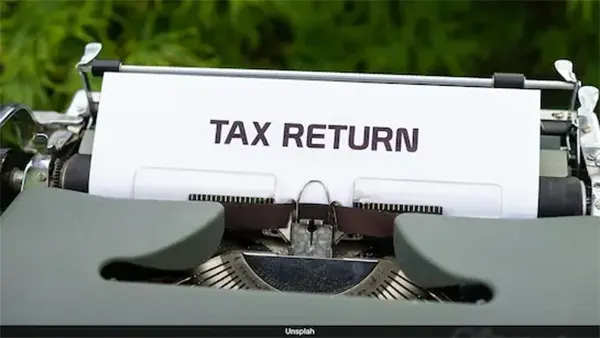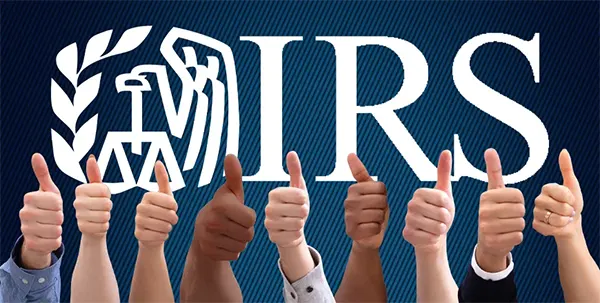What is Tax Topic 152? Explore Important Tips to Get a Faster Refund
“Every taxpayer in the United States is scratching their head on seeing the Tax Topic 152.”
But is it really a concern? It is just a generic code that represents the status of your income tax return as underprocessed. However, many people get confused and think it’s a warning or a problem with their return.
That’s exactly why I’ve written this article to uncover the truth behind the Tax Topic 152 refund information, reasons for delaying returns, and how to know their status.
Additionally, you can explore various strategies to avoid delays and get refunds faster. So, dig deeper to know if Tax Topic 152 good or bad!
- What is Tax Topic 152?
- Why Does Tax Topic 152 Appear on Your Tax Refund Status?
- Why Your Tax Return Needs Additional Review Time?
- What Should You Do When Tax Topic 152 Appears?
- How to Contact the IRS to Know the Income Tax Return Status?
- How Do You Avoid Future Delays in Income Tax Returns?
- The Bottom Line
- Frequently Asked Questions
What is Tax Topic 152?

Tax Topic 152 is a generic reference code that indicates that your income tax return may take longer to be refunded. The Internal Revenue Service (IRS) typically issues this code on the “Where’s my refund?” tool to highlight delays in refunds.
It is important to note that code 152 doesn’t require further actions and doesn’t mean you made a mistake in filing the return form. This simply represents that your return requires an additional review and has not been rejected or accepted.
Additionally, the IRS stated that 9 out of 10 taxpayers usually get a refund within 21 days. However, some individuals who encounter this reference code will find that their return is underprocessed.
So, don’t panic if you see Tax Topic 152 on your filing status.
Why Does Tax Topic 152 Appear on Your Tax Refund Status?
You might see Tax Topic 152 on your refund status, which typically indicates that it takes more time than the standard processing, refund adjustments, or pending status updates.
The following are common reasons why this code might show on your refund status.
1. Refund Adjustments
There is a chance that your return amount needs some adjustments due to missed deductions or corrections made. That’s why you need to wait for a certain period.
2. Pending Status Updates
It might appear when you claimed certain credits and filed a complex return that requires additional time for processing.
After acquiring knowledge on “what is Tax Topic 152” and the reasons why it appears on your status, you are all set to know what causes your return delays.
Also, if your business uses payroll accounting, you might want to check your payroll accounting services for streamlined compliance and to help avoid issues that delay filings.
Also Read: What is Receivables Financing? Why is Accounts Receivable Financing Important for Businesses?
Why Your Tax Return Needs Additional Review Time?

When your income tax returns are complex, need more documentation and identification, and you submit amended returns and special forms, it takes more time and delays the Tax Topic refund information.
Let’s take a look at the following reasons for delaying your return in great detail.
1. Complex Filing Status
Tax returns, including Earned Income Tax Credits (EITC) and Additional Child Tax Credit (ACTC), require numerous forms and schedules that can lead to extra verification from the IRS.
2. Documentation and Identification Needs
If identity theft is suspected, the IRS requests more significant documents for verification. It includes an Individual Taxpayer Identification Number (ITIN) or Tax Reference Number, Social Security Number (SSN), date of birth, and ZIP code.
3. Amended Returns and Special Forms
Amended returns involve corrections to previously filed returns and undergo a more thorough special review of tax liability. Not only this, but returns with Form 8379 (Injured House Allocation) or Form 8857 (Request for Innocent Spouse Relief) may experience delays in refund.
If your return is tied to your business, make sure your bookkeeping services are accurate and up-to-date so that the IRS doesn’t flag inconsistencies that could slow processing.
What Should You Do When Tax Topic 152 Appears?
Significantly, you should wait for 21 days, check the error, or contact the IRS when you encounter the Tax Topic 152. These three steps help you get essential details of your income tax return status without scratching your head.
So, have a look at these detailed actions you should take when the status is not updated.
1. Wait for 21 days
The IRS generally recommends waiting for 3 weeks or 21 days after filing your tax return. Your Form 1040-X will be processed after 8 to 12 weeks, and sometimes it could take up to 16 weeks.
2. Check the error
Review your filing document to see if any mistakes were made. If you filed it incorrectly, the IRS requests that you submit additional forms or a correction form. This may take a longer time to process your refund.
3. Contact the IRS
If you still see Tax Topic 152 after waiting 21 days, contact the IRS to check your refund status through the IRS help options.
Also, if you’re running a startup, having proper accounting services for startups ensures that your returns, deductions, and paperwork are on solid footing—potentially reducing review flags.
Therefore, skim through the next section to know how to contact the IRS for in-depth guidance. It is beneficial for you to get your refund updates quickly.
Also Read: What is Payroll Processing? Learn How Payroll Processing Works and Why It Is So Important
How to Contact the IRS to Know the Income Tax Return Status?

In order to contact the IRS, you can call them directly, visit your local IRS office, or reach out to the Taxpayer Advocate (if the IRS can’t provide solutions).
That’s why I jotted down the methods to contact the IRS or other representatives here for your guidance.
1. Call the IRS
If you can’t find information on the online portal, contact the IRS at 800-829-1954 for your refund information or 866-464-2050 to inquire about an amended refund.
It is advised to have your ITIN or personal identity information handy, as well as other notices from the IRS, when you are on the call.
2. Visit Your Local IRS Office
Additionally, you can make an appointment at your local IRS office through a “Find a Taxpayer Assistance Center office” and speak with a local officer. They may be able to give you additional insight into the status of your refund.
Plus, always remember to bring ID and significant documents to the IRS office, which helps the representative to check your personal status more efficiently.
3. The Taxpayer Advocate
On the other hand, you can also contact the Taxpayer Advocate Service. It is an independent agency within the IRS that helps taxpayers resolve their problems. So, you can reach out to your local taxpayer advocate, who may be able to help you.
Meanwhile, if your tax matters are linked to year-end financial closing, you may benefit from professional year-end accounts services to ensure all figures are clean and reduce red flags.
How Do You Avoid Future Delays in Income Tax Returns?
You should file electronically, double-check your information, choose direct deposit, and file as early as possible to avoid future delays in receiving income tax refunds.
For in-depth guidance, read thoroughly these essential tips for getting your next refund faster and to avoid Tax Topic 152.
1. File Electronically
E-filing is the fastest way to file your income tax return, and the IRS estimates refunds for electronic returns within 21 days. On the other hand, paper returns take more weeks or months for processing.
2. Double-Check your Information
You have to make sure that the numbers and details are filled correctly on your return form. The documents include employer (W2), bank (1099-INT), client (1099-NEC), miscellaneous entity (1099-MISC), payment processors (1099-K), and other income tax statements.
3. Choose Direct Deposit
Combining e-filing with direct deposits speeds up your refund, along with ensuring the security and privacy of your financial information. This avoids postal service delays and risks of a paper check being stolen or leaked.
4. File As Early As Possible
Filing early during the tax season helps you receive refunds faster than submitting at the last minute. It also reduces the risks of identity theft, where someone files a fraudulent return using your Social Security number.
Also, good cash management can help you stay ahead. Explore cash flow management services to keep your finances stable and reduce last-minute tax pressure.
Also Read: Retained Earnings: Explanation, Formula, and Importance for Businesses
The Bottom Line
You might be confused about whether Tax Topic 152 good or bad. But, don’t worry, it’s not a red flag. It is simply a code issued by the US government to indicate that your refund will take additional review time.
Still, if you find it a daunting task to file or track a return or cross-check amended refunds, you should hire tax professionals. They handle your tax accounting and audit your significant documents, avoiding delays and errors.
Frequently Asked Questions
Ans: Tax Topic 152 is neither good nor bad. It is generally a code that simply represents that your income tax return is under review.
Ans: It’s not possible to determine the exact time, but the standard processing time of the IRS is 21 days. Besides this, if Tax Topic 152 appears, it may take a long processing time.
Ans: No, it is not an audit. The code is just an informational message that your tax refund is taking longer than the standard time.
Ans: Yes, Tax Topic 152 can change to 151 when your income tax return includes past due debt, unpaid federal taxes, and discrepancies.
Ans: No, you should not be worried about the code 152. It is only issued by the IRS to highlight that your tax refund is taking additional review time.
Sources: